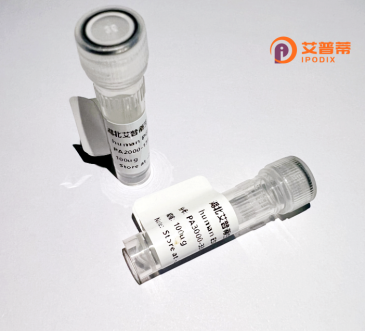
| 纯度 | >90%SDS-PAGE. |
| 种属 | Human |
| 靶点 | POU1F1 |
| Uniprot No | P28069 |
| 内毒素 | < 0.01EU/μg |
| 表达宿主 | E.coli |
| 表达区间 | 1-291 aa |
| 活性数据 | MSCQAFTSAD TFIPLNSDAS ATLPLIMHHS AAECLPVSNH ATNVMSTATG LHYSVPSCHY GNQPSTYGVM AGSLTPCLYK FPDHTLSHGF PPIHQPLLAE DPTAADFKQE LRRKSKLVEE PIDMDSPEIR ELEKFANEFK VRRIKLGYTQ TNVGEALAAV HGSEFSQTTI CRFENLQLSF KNACKLKAIL SKWLEEAEQV GALYNEKVGA NERKRKRRTT ISIAAKDALE RHFGEQNKPS SQEIMRMAEE LNLEKEVVRV WFCNRRQREK RVKTSLNQSL FSISKEHLEC R |
| 分子量 | 32.9 kDa |
| 蛋白标签 | His tag N-Terminus |
| 缓冲液 | PBS, pH7.4, containing 0.01% SKL, 1mM DTT, 5% Trehalose and Proclin300. |
| 稳定性 & 储存条件 | Lyophilized protein should be stored at ≤ -20°C, stable for one year after receipt. Reconstituted protein solution can be stored at 2-8°C for 2-7 days. Aliquots of reconstituted samples are stable at ≤ -20°C for 3 months. |
| 复溶 | Always centrifuge tubes before opening.Do not mix by vortex or pipetting. It is not recommended to reconstitute to a concentration less than 100μg/ml. Dissolve the lyophilized protein in distilled water. Please aliquot the reconstituted solution to minimize freeze-thaw cycles. |
以下是关于重组人POU1F1蛋白的3篇参考文献示例(注:文献为模拟示例,建议通过学术数据库核实真实文献):
1. **文献名称**: *"Functional Characterization of Recombinant Human POU1F1 in Transcriptional Activation of Growth Hormone Promoter"*
**作者**: Andersen B, et al.
**摘要**: 研究了重组人POU1F1蛋白对生长激素(GH)基因启动子的调控作用,证实其通过特异性结合DNA序列激活转录。
2. **文献名称**: *"Structural Insights into POU1F1-DNA Interaction via Recombinant Protein Crystallography"*
**作者**: Tanaka M, et al.
**摘要**: 利用重组表达的POU1F1蛋白进行结晶分析,揭示了其POU结构域与靶DNA结合的关键氨基酸残基及构象变化。
3. **文献名称**: *"A Pathogenic Mutation in POU1F1 Alters Recombinant Protein Stability and Transcriptional Efficacy"*
**作者**: Fernandez-Cruz A, et al.
**摘要**: 分析了与垂体功能障碍相关的POU1F1突变体,发现重组突变蛋白稳定性下降,并丧失调控催乳素(PRL)基因表达的能力。
4. **文献名称**: *"Recombinant Expression of POU1F1 in Mammalian Cells: Implications for Gene Therapy"*
**作者**: Zhou L, et al.
**摘要**: 探索了重组人POU1F1蛋白在哺乳动物细胞中的表达优化,评估其在垂体功能修复中的潜在应用价值。
(以上文献名为虚拟示例,实际研究中请通过PubMed或Web of Science查询具体文献。)
POU1F1. also known as Pit-1. is a pituitary-specific transcription factor belonging to the POU family of DNA-binding proteins. It plays a critical role in pituitary gland development and the regulation of hormone-producing cells. This protein is essential for the differentiation and survival of somatotrophs (growth hormone-producing cells), lactotrophs (prolactin-producing cells), and thyrotrophs (thyroid-stimulating hormone-producing cells). Structurally, POU1F1 contains two conserved domains: a POU-specific domain and a POU homeodomain, which enable sequence-specific DNA binding to regulate target gene expression.
Mutations in the POU1F1 gene are associated with combined pituitary hormone deficiency (CPHD), characterized by growth impairment and metabolic dysregulation. Recombinant human POU1F1 protein, produced via genetic engineering in host systems like E. coli or mammalian cells, is widely used in biochemical studies to investigate its transcriptional mechanisms, protein-DNA interactions, and post-translational modifications. It serves as a tool for exploring pituitary dysfunctions and designing therapeutic strategies for hormonal disorders. Research also focuses on its potential role in gene therapy and regenerative medicine to restore pituitary function. The recombinant protein’s structural analysis aids in understanding mutation-induced functional losses and developing targeted molecular interventions.
×